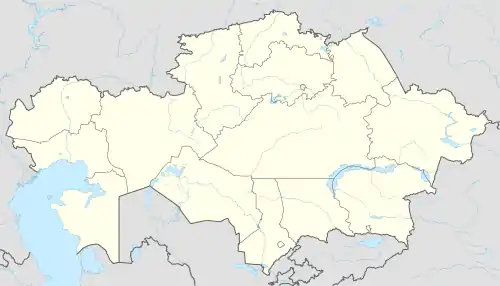Masanchi
Маsanchi (Kazakh: Масанчи) is a Kazakhstani village in the Korday District of the Jambyl Province. The village is located near the border with Kyrgyzstan, is approximately 45 kilometers southeast of the village of Korday, and approximately 130 kilometers southwest of Almaty.
Masanchi
Масанчи | |
|---|---|
 Masanchi Location of Masanchi within Kazakhstan | |
| Coordinates: 42.9289°N 75.3019°E | |
| Country | Kazakhstan |
| Region | Jambyl Region |
| District | Korday District |
The village has also been reported as having a large amount of ethnically Dungan people (people of Hui origin).[1]
Names
Town was originally called Karakunuz (Russian: Каракунуз, sometimes Караконыз or Караконуз), which means "black beetle" in Turkic languages.[2] The Dungans themselves used to refer to Karakunuz as Ingpan (Dungan: Инпан; Russian: Иньпан; Chinese: 營盤; pinyin: Yíngpán),[3] which is an archaic word in Chinese languages for "military camp."
From 1903 to 1918, the town was briefly renamed Nikolaevka after Tsar Nicholas II of Russia.[2] In 1965, Karakunuz was renamed Masanchi (sometimes spelt as "Masanchin"), after Magaza Masanchi or Masanchin (Dungan: Магәзы Масанчын; Chinese: 马三奇), a Dungan participant in the Communist Revolution and a Soviet Kazakhstan statesman.[2]
Demographics
| Year | Pop. | ±% |
|---|---|---|
| 1999 | 8,926 | — |
| 2009 | 13,606 | +52.4% |
According to the 2009 Census, the village of Masanchi had a population of 13,606 people, and the administrative district governing the village had a population of 14,502.[4] The 1999 Census reported populations of 8,926 and 9,608, respectively.[4] Of the 13,606 people in the village, 6,914 people were reported as men, and 6,692 were reported as women.[4]
Ethnic conflict
On 5 February 2020, a conflict between Kazakhs and Dungans broke out over the alleged beating of an elderly Kazakh man by a Dungan man.[5] The subsequent clashes have reportedly killed 8 people, caused the arrest of 47 more, and resulted in damage to local properties.[1]
References
- "'Ethnic clashes' in Kazakhstan kill eight". BBC News. 2020-02-08. Retrieved 2020-02-08.
- Jiménez-Tovar, Soledad (2016). "The Anthropologist as a Mushroom" (PDF). Field Notes and Research Projects. Max Planck Institute for Social Anthropology. ISSN 2193-987X. Retrieved 9 February 2020.
Right after Bi Yankhu’s arrival, from 1878 until 1903, the village was called ‘Karakunuz’, meaning ‘black beetle’ in local Turkic languages. Dyer (1992) believes that this was a nickname given by local Turkic-speakers to Dungans, due to the fact that Dungan women liked to wear black at that time. In 1903 the name changed to ‘Nikolaevka’ (after the Russian Tsar) and it changed again in 1918, when the name ‘Karakunuz’ was again adopted, and did not change until 1964, when, as part of the rehabilitation of Magaza Masanchi, the village was renamed after him: ‘Masanchi’. Besides these official names, Masanchi also has a Dungan name, Yinpan, which appears in the left image on the wall7.
- 刘宝军. 悲越天山——东干人记事 (in Chinese). Ningxia People's Publishing House. ISBN 7227027341. Archived from the original on 2017-02-13. Retrieved 2017-02-12.
从比什凯克市去东干人居住的心脏镇子——营盘,约有六十公里,一路上都有东干人的村落。
- "History of stat.kz". www.ivisa.com. Retrieved 2020-02-08. Archived at https://www.webcitation.org/6HNO4sHcM?url=http://www.stat.kz/p_perepis/DocLib1/Население%20рус%201%20том.pdf
- "Eight die, dozens wounded in southern Kazakhstan clashes". Al Jazeera. 8 Feb 2020. Retrieved 2020-02-08.